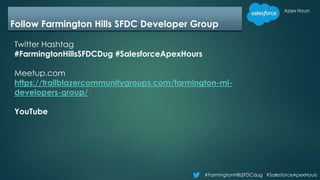Einstein Analytics
- 1. Farmington Hills Salesforce Developer User Group Apex Hours Einstein Analytics #SalesforceApexHours #FarmingtonHillsSFDCDug Speaker Date Venue/Link Rikke Hovgaard, Amit Chaudhary Saturday, OCT 20, 2018 10:00 AM EST ( 7:00 PM IST) https://zoom.us/j/972158462
- 2. Who am I ? Amit Chaudhary (Salesforce MVP) • Active on Salesforce Developer Community • Blogging at http://amitsalesforce.blogspot.in/ • Co-Organizer of – FarmingtonHillsSFDCDug • Follow us @Amit_SFDC or @ApexHours #SalesforceApexHours #FarmingtonHillsSFDCDug
- 3. Our Speaker Rikke Hovgaard Einstein Analytics Solution Architect with Salesforce (ACE team) User Group Leader Blogging at www.salesforceblogger.com Follow me on Twitter @HovsaRikke #SalesforceApexHours #FarmingtonHillsSFDCDug
- 4. ▶ Overview & Key Concepts ▶ Intro to the UI + build my first dataset ▶ Compare table ▶ Custom Maps ▶ Actions ▶ Embedding your dashboards AGENDA #SalesforceApexHours #FarmingtonHillsSFDCDug
- 5. #FarmingtonHillsSFDCdug #SalesforceApexHours Apex Hours This presentation may contain forward-looking statements that involve risks, uncertainties, and assumptions. If any such uncertainties materialize or if any of the assumptions proves incorrect, the results of salesforce.com, inc. could differ materially from the results expressed or implied by the forward-looking statements we make. All statements other than statements of historical fact could be deemed forward-looking, including any projections of product or service availability, subscriber growth, earnings, revenues, or other financial items and any statements regarding strategies or plans of management for future operations, statements of belief, any statements concerning new, planned, or upgraded services or technology developments and customer contracts or use of our services. The risks and uncertainties referred to above include – but are not limited to – risks associated with developing and delivering new functionality for our service, new products and services, our new business model, our past operating losses, possible fluctuations in our operating results and rate of growth, interruptions or delays in our Web hosting, breach of our security measures, the outcome of any litigation, risks associated with completed and any possible mergers and acquisitions, the immature market in which we operate, our relatively limited operating history, our ability to expand, retain, and motivate our employees and manage our growth, new releases of our service and successful customer deployment, our limited history reselling non-salesforce.com products, and utilization and selling to larger enterprise customers. Further information on potential factors that could affect the financial results of salesforce.com, inc. is included in our annual report on Form 10-K for the most recent fiscal year and in our quarterly report on Form 10-Q for the most recent fiscal quarter. These documents and others containing important disclosures are available on the SEC Filings section of the Investor Information section of our Web site. Any unreleased services or features referenced in this or other presentations, press releases or public statements are not currently available and may not be delivered on time or at all. Customers who purchase our services should make the purchase decisions based upon features that are currently available. Salesforce.com, inc. assumes no obligation and does not intend to update these forward-looking statements. Statement under the Private Securities Litigation Reform Act of 1995 Forward-Looking Statement
- 6. #FarmingtonHillsSFDCdug #SalesforceApexHours Apex Hours Concepts Report Type → Dataset Report → Lens Dashboard → Dashboard Folder → App Data flow
- 7. #FarmingtonHillsSFDCdug #SalesforceApexHours Apex Hours More Concepts Dataflow/DataPrep (IngestionofData) → → Dataset Lens Dashboard
- 8. #FarmingtonHillsSFDCdug #SalesforceApexHours Apex Hours Let’s look at the UI
- 9. #FarmingtonHillsSFDCdug #SalesforceApexHours Apex Hours And finally… more concepts App Account Oppty Oppty Line Item Root Oppty Line Item Oppty Account Owner Root Einstein AnalyticsStandard Reporting
- 10. #FarmingtonHillsSFDCdug #SalesforceApexHours Apex Hours Let’s create that dataset
- 11. Apex Hours #FarmingtonHillsSFDCdug #SalesforceApexHours Compare Tables ▶ What: table format to compare and calculate ▶ As soon as you need to calculate think compare table ▶ Example: % change from one month to another, YTD comparison ▶ Try it yourself: ▶ http://www.salesforceblogger.com/2017/10/03/einstein-analytics- calculation-without-code/ ▶ http://www.salesforceblogger.com/2017/11/20/ytd-comparison- with-compare-tables/
- 13. Apex Hours #FarmingtonHillsSFDCdug #SalesforceApexHours Custom Maps ▶ What: view data in a visually different way in maps – but create your own! ▶ Example: Specific sales regions, race track, stadium ▶ Try it yourself: ▶ https://trailhead.salesforce.com/en/content/learn/projects/wave _charts_custom_map ▶ https://www.youtube.com/watch?v=U7SwnjYm1mQ
- 15. Apex Hours #FarmingtonHillsSFDCdug #SalesforceApexHours Actions ▶ What: act on insight you get directly from your dashboard using global actions. ▶ Example: Open record in Salesforce, post to chatter, add to campaign ▶ Try it yourself: ▶ https://www.youtube.com/watch?v=nc8wytTMhqw
- 17. Apex Hours #FarmingtonHillsSFDCdug #SalesforceApexHours Embedding ▶ What: don’t look for dashboard, place them where the users are ▶ Example: Account overview on the account page and filter on just the relevant account ▶ Try it yourself: ▶ https://www.youtube.com/watch?v=Yi8i83vho5Y
- 19. Apex Hours #FarmingtonHillsSFDCdug #SalesforceApexHours That’s all folks… ▶ Next time let’s look at some more advanced features… ▶ Dataflow ▶ SAQL ▶ October 27th same time, same place ▶ https://trailblazercommunitygroups.com/events/details/salesfor ce-farmington-mi-developers-group-presents-salesforce-apex- hours-einstein-analytics-part-2#/ ▶ Embarking on your EA journey? http://www.salesforceblogger.com/2018/02/05/embarking-on- your-einstein-analytics-journey-start-here/
- 20. Apex Hours #FarmingtonHillsSFDCdug #SalesforceApexHours Follow Farmington Hills SFDC Developer Group Twitter Hashtag #FarmingtonHillsSFDCDug #SalesforceApexHours Meetup.com https://trailblazercommunitygroups.com/farmington-mi- developers-group/ YouTube
Editor's Notes
- Key Message Salesforce is a publicly traded company. Customers should make buying decisions only on the products commercially available. Talk Track Before I begin, just a quick note that you should base your purchasing decisions on products and services that are currently available.
- There are a few concepts from EA that are good to know. I've tried to compare them with std reporting though it two tools that work differently. Datasets are our data, the way we structure our objects, so it's similar to what report types do. To create this structure we use the dataflow. Once we do a single exploration with measures and groupings that is a lens similar to a report. Dashboards is well dashboards. And instead of folders in EA we use apps, but works in the same way as folders controlling access.
- How many of you have experience that your std report times out? We don't have the same issue in EA since we grab the data from the objects we need and put in a flat file. Once we have that we can index the columns - similarly to what you have in a book that uses an index in the back of it - so we can quickly find what we are looking for. Key thing is we can bring any data together and even do some data prep before we allow user to explore the data in lenses and dashboards. And btw we don't need to save a lens to use it in a dashboard.
- Another thing to be aware off is that in order for us to combine data freely in EA we look at the most detailed level. To the left you will see how std reports work, we start at the top and become more detailed with each level - until we reach the 3rd level. In EA we turn this around and start with oppty line item and then add more detail to it looking upwards. You can add as many objects as you want as long as they have a relation.



















